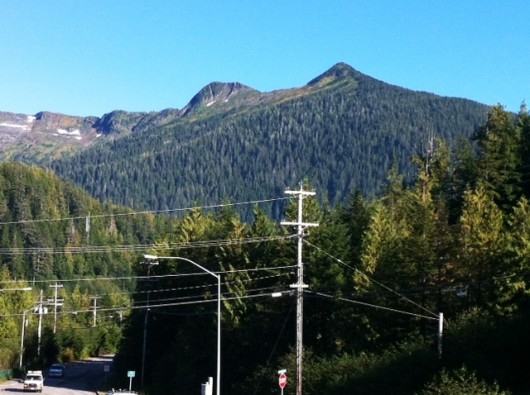Despite public outcry from Ketchikan and Petersburg residents over recently announced plans to log Alaska Mental Health Trust-owned land within those communities, the state agency hasn’t backed down on its decision.
So, if federal land exchange legislation doesn’t pass Congress this session, the process to open Ketchikan’s Deer Mountain and land above homes on Petersburg’s Mitkof Highway to logging will begin.
But, there are some options that the Trust might consider.
It’s been about two weeks since the Alaska Mental Health Trust board voted to move forward with logging parcels in Ketchikan and Petersburg if the federal land exchange isn’t approved by Jan. 15th.
In that time, there’s been a strong public reaction in Ketchikan and Petersburg. John Morrison, executive director of Alaska Mental Health Trust Land Office, said that wasn’t a surprise.
“I don’t think the reaction was any different than we anticipated,” he said. But, “the best way to save Deer Mountain, as they say, is to do whatever they can to affect the legislation that will direct the land exchange.”
“Save Deer Mountain” is the name of a Ketchikan group that formed a day after the Trust Board’s decision. Organizer Bob Weinstein said the group’s Facebook page quickly attracted more than 1,000 followers, and has been a primary source of sharing information and concerns.
One big concern has been the Jan. 15th deadline. Weinstein argues that doesn’t give Congress enough time to act, especially in an election year.
But, Morrison said the Jan. 15th deadline was carefully chosen. He said the Trust needs to start its timber-sale process by then, because otherwise the timber industry might be gone.
“The timber industry in Southeast Alaska has openly said in Alaska Forestry Association meetings that they effectively have enough timber to last and make their business operations viable through mid-2017,” he said, which means the Trust needs to take advantage of the timberland it has while it still can.
So, sometime before Jan. 15th, they’ll know whether the land exchange is going to happen. If it isn’t going to happen, Morrison said the Trust Land Office will draft a best-interest opinion to log the land, and will publish that for 30 days. After that, he said, there’s a 20-day period to consider public input, and then another 20 days to reconsider the decision to log.
Then, “based on weather conditions and things of that nature, we would potentially let a contract this coming spring. It would be up to the operator as to the timing of when they harvested the timber,” he said.
But what about some options people in the affected communities have suggested? Like purchasing the land to keep the trees in place?
Morrison said until it’s clear the land exchange won’t happen this session of Congress, the trust won’t pull any parcels from that exchange package – and the exchange is the Trust’s preferred resolution.
the trust won’t pull any parcels from that exchange package – and the exchange is the Trust’s preferred resolution.
But if and when it’s clear that the exchange is off the table, he said, “we would gladly accept application to purchase this property, purchase the carbon credits on the property – I can think of any number of things we might consider – however, they would have to be in the best interest of the trust. So, assuming we had more than one option – logging is one that’s on the table now – if we had more than one option, we would weigh those options as to which was in the best interest of the trust and proceed with that option.”
Since the Trust’s announcement, local governments in Ketchikan and Petersburg have gone on record opposing the proposed harvest and supporting the land exchange, as have other officials and individual residents.
Weinstein said he, too, supports the land exchange, but he has issues with how the Trust board made its decision. He questions the legality of the vote itself, and said there was a lack of proper notice and procedure. Weinstein also questions the feasibility of logging Deer Mountain.
“They haven’t yet talked about, really, given the slopes on Deer Mountain, A) the viability of truly doing a substantial harvest B) if they will put up a bond to deal with landslides that are likely to occur,” he said.
Similar concerns about landslides have been expressed regarding the Petersburg parcel.
Weinstein also disputes the argument that logging must happen now before the timber industry completely dies. He said the state could help.
“Can they move up, for example, some potential sales in the state forest to help bridge the time needed to help make a reasonable effort to see the legislation pass?” he said.
Weinstein said he hopes the governor’s office will step in to help come up with a reasonable path forward.
He adds that the idea of communities purchasing the parcels is something to consider, and he was not aware until recently that the Trust would even consider that option. He said that’s an example of the lack of communication from the state agency.
“For me, that’s all the more reason why I think it would be more helpful for them to have a proactive, positive dialogue with the community, get us behind the exchange legislation, instead of taking the approach they did, that I think is rather boneheaded and counterproductive to what they’re trying to do,” he said.
While the Trust board won’t consider options like a land sale until after it’s clear that the exchange won’t happen, Morrison said proposals can be submitted anytime.
So, if anyone wants to buy a mountain…






